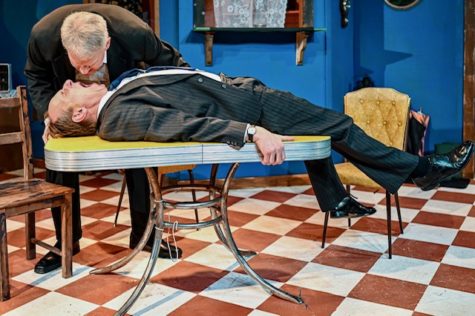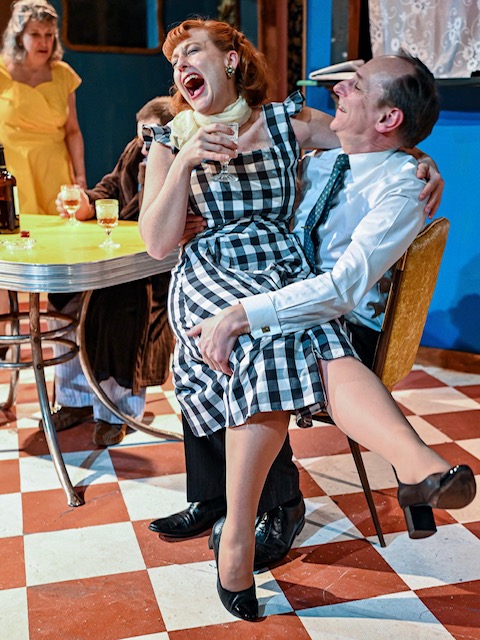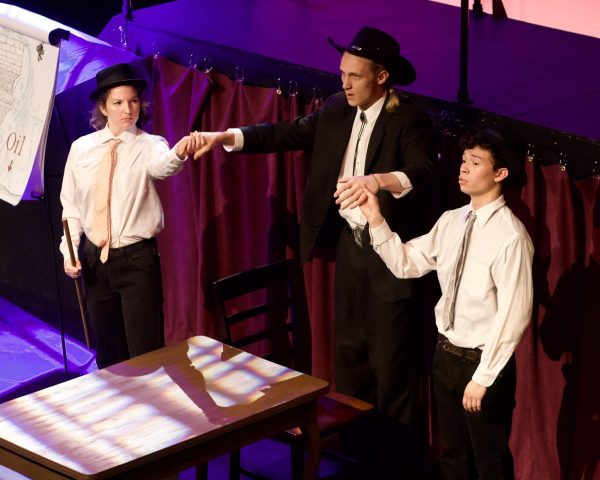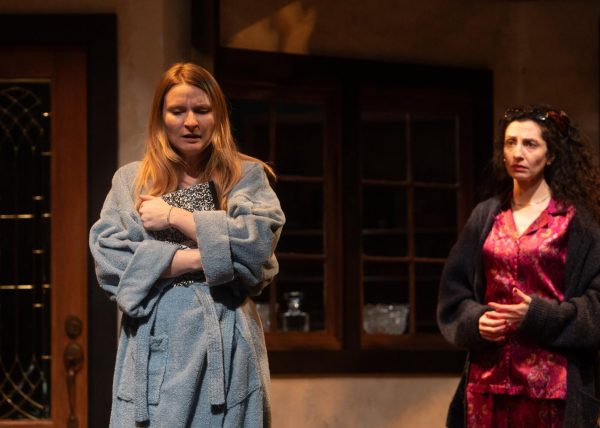City Lit Theater Flirts with Uncertainty in Pinter’s The Birthday Party
From left to right: Elaine Carlson, David Fink, Sahara Glasener-Boles, James Sparling in City Lit Theater’s production of “The Birthday Party.” (Photo by Steve Graue.)
February 5, 2023
Content warning: This article mentions sexual violence.
In Edgewater, Chicago, City Lit Theater’s production of Harold Pinter’s 1957 The Birthday Party is frightening; immersive; and, above all, sophisticated. The Nobel Prize–winning Pinter—author of The Homecoming, Betrayal, and 27 other plays—has come to be regarded as one of the fathers of contemporary theater; The Birthday Party is perhaps the writer’s most dashingly complex work. Meg and her husband Petey own a small English maybe-a-boarding-house, home to the peculiarly reclusive maybe-used-to-be-a-pianist Stanley Webber. Into this quaint locale—all three acts take place in the same living/dining room—walk two refined, menacing professional men, the Irish McCann and the Jewish Goldberg. City Lit remains faithful to Pinter’s delightful script, and over two hours, what plays out is nothing less than three chokings, an attempted rape, various screaming matches, and the total psychological crumbling of Stanley. At play’s end, McCann and Goldberg take the apathetic Stanley away—to where, it is unclear, and it doesn’t really matter.
Crucially, Pinter and City Lit craft this uncertain plot and these shifty characters while avoiding a postmodernist rejection of certainty and meaning. The point of The Birthday Party is not that nothing can be known, nor even that nothing here is known, but rather that in such confusion of unknowing, Stanley and his hosts are susceptible to exploitation by McCann and Goldberg, who are more comfortable in their half-truths than Stanley and Meg are in their delusional worldviews. McCann and Goldberg—whether or not they represent Christianity and Judaism respectively—derive their power from the kinds of sweet, probably false, lifetime recollections that lure in the naïve Meg and young neighbor Lulu. By the time Stanley’s self-appointed guardians have been drugged (literally and figuratively) by the two men, it’s too late for Stanley.
The only confirmed-to-be-happening plot of the play—flirting, drinking, a blind-folded game—is confined to the second act, in which the six characters celebrate Stanley’s birthday. Of course, whether it is actually Stanley’s birthday is unimportant. Stanley, played by a wonderfully contortive David Fink, mostly sits morose as Meg flirts with McCann and Goldberg flirts with Lulu. Stanley’s isolation is at least partly willing, while Meg’s is existentially sad and lonely, played well by Elaine Carlson. (In the 60-plus years since The Birthday Party’s publishing, one theory of the play’s meaning that this reviewer finds rather unsatisfying is that Stanley, McCann, and Goldberg are mental creations of Meg’s).
Really, this play revolves around McCann and Goldberg. James Sparling, as Goldberg, dazzles; as the experienced, middle-aged pseudo con man, he produces an intoxicating spectacle of theatrical brilliance. Such an understated yet overwhelming performance is rare to come by. Goldberg’s association to the younger, much larger, and generally more erratic McCann is the play’s strongest, most intriguing relationship. As Sparling saunters and sails his way across the stage, he proclaims Stanley’s many faults with a quiet roar. When he explodes midway through the second act and crumbles midway through the third, his transitions feel coolly calculated and scarily real. What is so terrifying, truly, is the extent to which Sparling, with his charismatic grin and command of Pinter’s nonsensical mini-monologues, seduces the audience alongside Meg and Lulu.
Aiding Goldberg’s projection of authority is a well-tailored pinstripe suit, a bowler, and a couple of ties; The massive McCann dons a loose-fitting black-and-white suit. Stanley’s transition from brown bathrobe to brown-and-white striated suit comes as he loses his sentience. It is perhaps a warning of the individual’s susceptibility to outside influence, perhaps an unhappy comment on the relation of artist to society. Jennifer Susan’s costuming, delightfully, complements not only the characters but their personalities.
All this fits into The Birthday Party’s quietly beautiful artistic vision. Ray Toler and Anna Petersen’s set is part 1950s diner, part seaside bed-and-breakfast. Stefan Brun’s lighting design is, if a little harsh, realistic and warm. Remarkably, the spookily recorded “Happy Birthday” soundtrack that plays at the beginning of each act works. The play’s only inadequacies are an unrealistic car motor sound effect and a poorly used table upstage—minor faults indeed.

To be clear, The Birthday Party is not meant for those people who do not wish to dissect the theater and recoil at what they have discovered. This is a play for those who don’t mind watching an adult man blow into his friend’s mouth repeatedly. This is a play for those who desire to be confused; reassured; re-confused; and, finally, left unsatisfied. Such people do not exist in The Birthday Party; the desire for certainty is definitely one target of Pinter’s social criticism. Really, though, this is a play for anyone who wishes—as Meg and Lulu wish and as Stanley submits—to be spun a fabulous, fantastical, maybe-real-maybe-not-maybe-it-does-not-matter story.
Harold Pinter’s The Birthday Party is at City Lit Theater through February 26.













